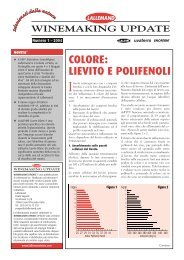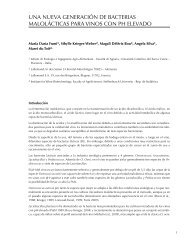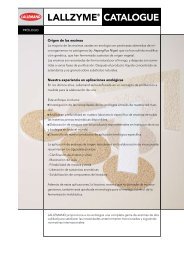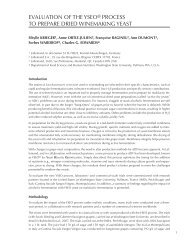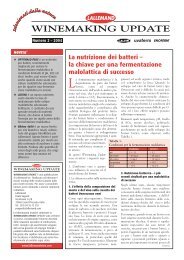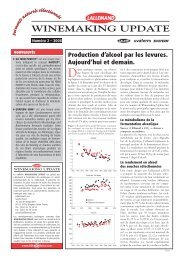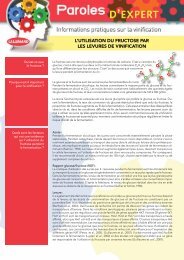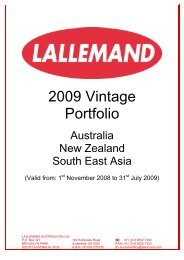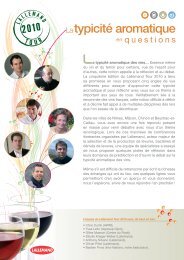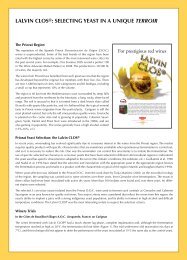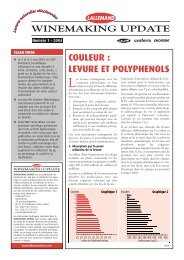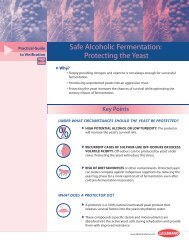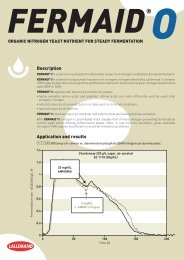ICV D254 - Dominique Delteil Consultant
ICV D254 - Dominique Delteil Consultant
ICV D254 - Dominique Delteil Consultant
Create successful ePaper yourself
Turn your PDF publications into a flip-book with our unique Google optimized e-Paper software.
SACCHAROMYCES CEREVISIAE<br />
CEREVISIAE<br />
MOUTHFEEL,<br />
CONCENTRATION<br />
AND RIPE AROMAS<br />
TERROIR SELECTION<br />
Vignoble<br />
CôTES DU RHôNE<br />
LALVIN<br />
I C V<br />
<strong>D254</strong> ®<br />
For more than 25 years,<br />
Lallemand has been selecting<br />
the best winemaking<br />
yeasts from nature. The ever-more challenging<br />
conditions of fermentation have propelled<br />
Lallemand to develop a new production<br />
process for these natural yeasts – the YSEO ®<br />
process – which optimizes the reliability of<br />
alcoholic fermentation and reduces the risks<br />
of fermentation off-flavours. YSEO ® yeasts<br />
are 100% natural and non-GMO.<br />
Applications<br />
Lalvin <strong>ICV</strong> <strong>D254</strong> ® was selected by the <strong>ICV</strong><br />
(Institut Coopératif du Vin) from Syrah fermentations<br />
in the Rhône Valley. In red wines,<br />
Lalvin <strong>ICV</strong> <strong>D254</strong> ® promises high fore-mouth<br />
volume, big mid-palate mouthfeel, intense<br />
fruit concentration, smooth tannins and a<br />
mildly spicy finish characterize it. Red wines<br />
made with Lalvin <strong>ICV</strong> <strong>D254</strong> ® may be blended<br />
with Lalvin <strong>ICV</strong> D80 ® or Lalvin <strong>ICV</strong> D21 ® to<br />
create more concentrated, fuller bodied wines.<br />
As a complement to Lalvin CY3079 ® ,<br />
winemakers use Lalvin <strong>ICV</strong> <strong>D254</strong> ® for fermenting<br />
chardonnay with nutty aromas and<br />
creamy mouthfeel.
MICROBIOLOGICAL AND OENOLOGICAL PROPERTIES<br />
• Saccharomyces cerevisiae var. cerevisiae<br />
• Neutral towards the competitive<br />
factor K2<br />
• Short lag phase<br />
• Moderate fermentation rate<br />
• Alcohol tolerance up to 16% when<br />
the fermentation is aerated and the<br />
temperature is maintained below 28°C<br />
• Optimum temperature range: 15 to 30°C<br />
• High production of mannoproteins<br />
during fermentation<br />
<br />
<br />
<br />
<br />
<br />
<br />
<br />
<br />
<br />
<br />
<br />
<br />
Red winemaking: 25 to 40 g/hL<br />
• Especially when used for white<br />
fermentations, Lalvin <strong>ICV</strong> <strong>D254</strong> ®<br />
benefits from rehydration with<br />
Go-Ferm ® . Average requirement in<br />
assimilable nitrogen<br />
• High consumption of SO 2<br />
during<br />
fermentation<br />
• Average production of volatile acidity:<br />
0.3g to 0.45g/L eqH 2<br />
SO 4<br />
• Low SO 2<br />
production<br />
• Low production of H 2<br />
S<br />
• Low foam formation<br />
MANNOPROTEINS AND POLYPHENOLS STABILITY<br />
<br />
<br />
<br />
<br />
<br />
<br />
Effect of the Lalvin <strong>ICV</strong> <strong>D254</strong> ® yeast on the color and<br />
polyphenol stability after 3 years in a 1992 Grenache<br />
wine ( R&D <strong>ICV</strong>)<br />
<br />
<br />
<br />
<br />
<br />
<br />
<br />
<br />
<br />
DOSAGE<br />
INSTRUCTIONS FOR USE<br />
<br />
<br />
<br />
Comparison in the polysaccharides production<br />
between different yeasts in synthetic must (Rosi et<br />
al., 1998).<br />
Explanation: some polysaccharides produced by the yeast during alcoholic fermentation can combine<br />
with polyphenols and increase stability (Saucier et al. 1996) (Escot et al, 2001)<br />
1°/ Rehydrate in 10 times its weight of water (temperature between 35 and 40°C).<br />
2°/ Dissolve carefully by gentle stirring and wait for 20 minutes.<br />
3°/ Add to the must. The temperature difference between the must to be inoculated<br />
and the rehydration medium should never be over 10°C (if any doubt, please contact<br />
your supplier or Lallemand).<br />
4°/ The total rehydration duration should never exceed 45 minutes.<br />
5°/ It is essential to rehydrate the yeast in a clean container.<br />
6°/ The rehydration in must is not advisable.<br />
The information herein is true and accurate to the best of our knowledge however this data sheet is not to be considered as a guarantee expressed or implied or as a condition of sale of this product.<br />
Selected<br />
and<br />
producted by<br />
B.P. 59<br />
31702 Blagnac CEDEX<br />
tel : +33(0)5 62 74 55 55<br />
fax : +33(0)5 62 74 55 00<br />
@<br />
www.lallemandwine.com<br />
Natural solutions that add value to the world of winemaking<br />
Distributor



